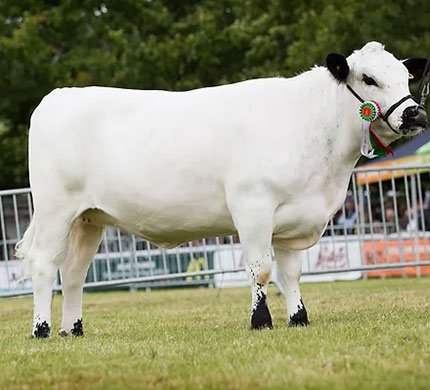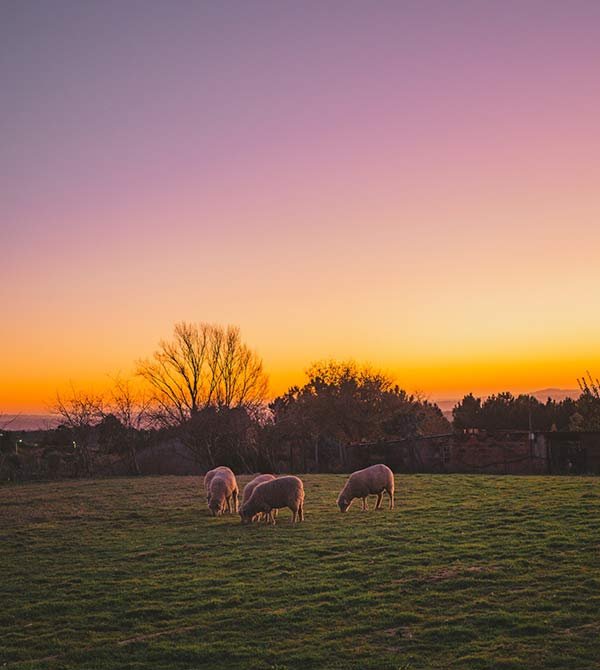British White Cattle
- Temperature:0°C to 25°C
- Milk:2.6 to 4.2 gallons of milk per day
- Food:Pasture, Hay
- Pregnancy:Approximately 283 days
- Nationality:England

General Information
British White cattle are a breed of beef cattle that originated in England. They are medium-sized cattle with a distinctive white coat and black points (ears, nose, and feet). They are known for their docile temperament, hardiness, and good mothering abilities.
The British White breed was developed in the late 19th century by crossing indigenous cattle breeds, such as the Whitebred Shorthorn and the Welsh Black, with other breeds like the Hereford and the Aberdeen Angus. The resulting cattle were hardy, adaptable, and well-suited to the rugged terrain and harsh climate of the British Isles.
British White cattle are typically raised for beef production and are known for their high-quality meat, which is well-marbled and flavorful. They are also popular as a show animal due to their distinctive appearance and docile temperament.
Where we find this cow to buy?
If you’re interested in buying British White cattle, you can start by contacting your local agricultural extension office or breed association to get a list of breeders in your area. You can also check online marketplaces and classified ads for livestock sales, as well as attending livestock auctions and shows.
Additionally, many breeders and ranchers have websites where they advertise their stock and provide contact information for sales.
You can also reach out to other farmers in your area who may have British White cattle and ask for referrals to reputable breeders or sales contacts.
It’s important to research and choose a reputable breeder who can provide you with healthy and genetically sound cattle, as well as offer advice and support as you establish your herd.
When purchasing British White cattle or any other livestock, it’s important to consider factors such as breed characteristics, temperament, and health status, as well as your own goals and resources for raising and managing your animals.

How to increase milk production in British White Cattle
To increase milk production in British White cattle, there are several management practices that can be followed:
01
Providing a balanced diet with the right balance of protein, energy, and minerals is essential for optimal milk production. Consult with a veterinarian or livestock nutritionist to determine the optimal diet.
02
Establishing a consistent milking routine can help maximize milk production. Cows should be milked at regular intervals, and the milking equipment should be properly cleaned and maintained to prevent mastitis and other health issues.
03
Maintaining good health in your cattle is essential for optimal milk production. Regular health checks, vaccinations, and deworming can help prevent diseases that can decrease milk production.
04
Selecting cows with high milk production genetics can help increase milk production in your herd. It’s important to work with a reputable breeder who can provide you with cows with high milk production genetics.
Medicine
There are several medicines that are commonly used in the management of British White cattle. These include:
01
AntibioticsAntibiotics should be prescribed by a veterinarian to treat bacterial infections in cattle.
02
AnthelminticsAnthelmintics are medicines used to control internal parasites in cattle, such as roundworms, tapeworms, and flukes.
03
VaccinesVaccines are used to prevent diseases in cattle, so it is important to follow a vaccination schedule and work with a veterinarian.
04
Pain RelieversPain relievers, such as NSAIDs, can be used to manage pain in cattle, such as after surgery or during injury.
Pregnancy
Around 30-60 days after breeding, a veterinarian can perform a pregnancy diagnosis to confirm if the cow is pregnant. This can be done through ultrasound or rectal palpation.
This is the period of sexual receptivity in female cattle, during which they will accept the advances of a male for breeding. Estrus typically lasts 12-18 hours, and occurs every 18-24 days in non-pregnant cows.
After breeding, the cow will enter a period of gestation, which lasts approximately 9 months (or 283 days).
Once a cow is in estrus, she can be bred by a bull or through artificial insemination.
Important!
After giving birth, the cow will enter a period of lactation, during which she will produce milk for her calf. It’s important to monitor the cow and calf for any potential health issues, and to provide appropriate nutrition and management for optimal health and production.
Food
British White cattle are adaptable and versatile, and they can thrive on a variety of feed sources. Here are some types of food that are suitable for British White cattle:
British White cattle are well-suited for grazing on pasture, and they can extract nutrients from coarse grasses and forages. High-quality pasture with a mix of grasses and legumes can provide a balanced diet for British White cattle.
Hay is a common feed source for cattle during the winter months when pasture is not available. Good quality hay should be free of mold and dust and should provide adequate energy and protein for British White cattle.
Silage is a fermented feed made from chopped grass or other forages, providing energy for British White cattle during times of low pasture availability.
British White cattle can be fed grains such as corn, barley, and wheat, but in moderation and with adequate roughage to prevent digestive problems.
Facts
Here are some facts about British White cattle:
They have a good feed-to-weight gain ratio, which makes them an efficient breed for meat production.
They are medium-sized cattle, with mature cows weighing between 900-1100 pounds and mature bulls weighing between 1600-2000 pounds.
British White cattle are primarily raised for beef production, but they are also used for dairy production and as draft animals.
They are known for their docile temperament, which makes them easy to handle and ideal for small farms or hobby farms.
British White cattle are a breed of cattle developed from a combination of ancient cattle breeds.
British White cattle have distinctive white coats with black or red points, including their ears, noses, and feet.
British White cattle are considered a rare breed, with a small population size in the United States and other countries.
They have a good feed-to-weight gain ratio, which makes them an efficient breed for meat production.